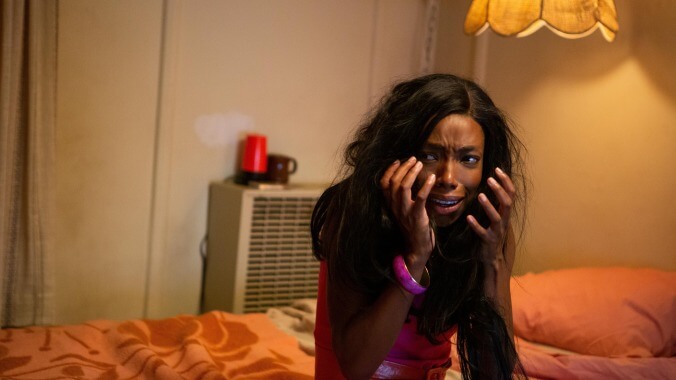Since the success of his 2014 comedy Dear White People—and the Netflix series it inspired—writer-director Justin Simien has maintained an abiding interest in distilling the complex Black American experience into creative storytelling. Bad Hair, his latest satire, blends his penchant for cultural commentary with horror—a genre that would benefit, one might assume, from his perspective and crafty repartee. But while the comedy aspect of this Sundance standout works in parts, the horror of it all suffers from knotty reasoning and an unclear thesis.
Anna (Elle Lorraine) is a determined production assistant in the late ’80s at a culture-forward TV network named, well, Culture. Among her abundantly charismatic colleagues, Anna blends in to a fault. Yet her aspiration to produce her own show is threatened not by her potential lack of experience or mousiness but by her natural hair, a style choice that Anna made after an acutely traumatizing experience with a perm kit that left her with a still-tender bald spot. Anna’s stalled career gets a potential recharge, however, once new boss Zora (Vanessa Williams), an ex-model aiming to rebrand the plucky network for a more diverse (or whiter, to put it plainly) audience, recognizes her potential and offers to put her on the path toward her dreams. But before anyone at the company can take Anna seriously, she has to learn how to blend in with Culture’s new look—and it starts with her hair.
Zora recommends that Anna visit Virgie (Laverne Cox), a top-notch weave specialist who can grant her the desired look. After a particularly painful session, Anna finally has the shiny, straight hair that will land her her dream job. But when her new ’do begins to lose its luster, the only thing that will effectively tame it is a steady supply of blood. Soon enough, its insatiable appetite turns murderous, much to Anna’s terror.
With a horror premise rooted in a very specific cultural experience, early comparisons to Jordan Peele’s work were inevitable. (Hulu’s trailer for the film, backed by a haunting rendition of Bell Biv DeVoe’s “Poison,” does exude strong Us vibes, which didn’t help). However, there’s a stronger tie to Chris Rock’s 2009 documentary, Good Hair, which essentially explored one man’s curiosity and eventual judgment regarding Black women and how they choose to style their hair. Like that film, this one is guided by the perspective of a person not directly affected by the chosen subject. While there is absolutely something to be said about the ways Eurocentric beauty standards have been weaponized against Black women for centuries, Bad Hair conveniently ignores the complex relationship that Black women have with their hair, including their autonomy in the matter. The idea that some women may just want to try a new look or explore the versatility of their own hair without some attached trauma never seems to occur to the film. Its conversation is rigid, pitting natural hair against weave or other methods of maintenance.
At least, that seems to be the conversation Bad Hair wishes to spark. If it intends to be an indictment of the entertainment industry’s deeply engrained devotion to the status quo or its hostile treatment of Black women, it doesn’t expose the inner culture of Culture nearly enough. There just isn’t a fully formed exploration of why Black women in particular can feel pressured to conform to certain aesthetics in order to survive in corporate America. Instead, the terror visited upon Anna and her colleagues comes at the hands (or follicles, maybe?) of her occasionally anthropomorphic hair, leaving the audience to wonder exactly what assertion Simien is making in this context. More importantly, as a person who doesn’t identify as a Black woman, how he’s qualified to make any assertion on the subject remains as unclear as the messaging.
When you strip away Bad Hair’s murky politics, you’re still left with its even muddier execution of horror elements. While it delivers plenty of gory imagery, the lore is hardly cohesive. How exactly does this killer hair work anyway? Do the bewitched extensions actually control their wearers? While Anna’s motives for succumbing to her maniacal mane are thankfully clearer, it’s difficult to understand why anyone with even tenuous knowledge of the hair’s capabilities (like Zora, for instance) would expose others to it without dastardly intentions. Meanwhile, any moments of tension are oddly soothed by either humor or convenient reveals that feel more like distracting cop-outs.
Comedy is Bad Hair’s stronger suit, thanks to a solid cast and a plot that’s sillier than it is insightful. Lorraine conveys fear and wide-eyed optimism very well, and is more than equipped for a leading role, regardless of genre. Williams, hardly a stranger to the ruthless media boss role (remember her Ugly Betty days), has the crack timing and enviable commitment of a camp pro. That said, the humor, at times, also serves as a bit of a crutch, especially near the story’s climax. Lena Waithe, for instance, is easily the comedic ace of the cast, and Simien’s desire to keep her around as long as possible leads to repeated gags that drag the film out longer than strictly necessary. (Although more than 10 minutes have been shaved off the film since it premiered at Sundance, more pruning probably wouldn’t have hurt.)
As in Dear White People, Simien commendably handles the comedy, and he can’t be faulted for wanting to try something new, especially when horror and sci-fi serve as great means of conveying a nuanced experience in a gripping visual way. But Bad Hair might be a little too silly to take seriously. More than anything, it’s a confusing example of what happens when a creator doesn’t appear to have anything clear to say, only a strong desire to say something.

 Keep scrolling for more great stories.
Keep scrolling for more great stories.
